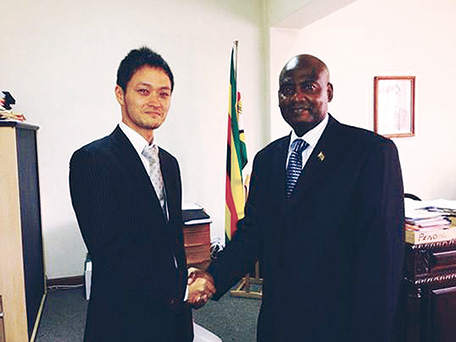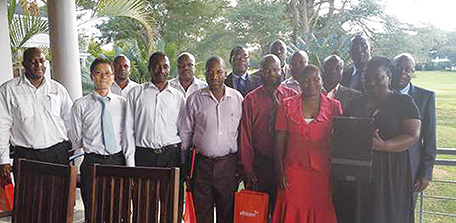Stories from the field 04
Contributing to Zimbabwe’s ICT Policies through Legislation
– One JICA Japan Overseas Cooperation Volunteer’s Humble Enthusiasm and Expertise

Mr. Niimi (left) with Sam Kundishora, Permanent Secretary of MICTPCS of Zimbabwe. (Photo: Toru Niimi)
“Japan Overseas Cooperation Volunteers (JOCVs) need to have expertise, humility and enthusiasm.”
These are the words of Mr. Toru Niimi who was dispatched to Zimbabwe as a JOCV with IT expertise for a two-year period starting in March 2012. Zimbabwe is ranked 124th in the world in terms of ICT utilization and the development of this field represents an urgent task for the development of the nation.
After graduating from university, Mr. Niimi worked for a major software company for about seven years. During that time he was dispatched as an IT consultant to companies using his firm’s software, and was responsible for detecting issues arising from system development and identifying technical solutions. At Zimbabwe’s Ministry of Information Communication Technology, Postal and Courier Services (MICTPCS), Mr. Niimi utilized his professional experience to help identify issues faced by MICTPCS and propose solutions.
A major task in his first year was to improve information security. MICTPCS was commissioned by the Ministry of Finance and Economic Development (MFED) to operate the government’s financial management system, but it did not have a security system in place to protect this important data. Mr. Niimi worked together with engineers on the frontlines to identify system issues and create an information security policy.
This work was highly commended by Dr. Sam Kundishora, Permanent Secretary, MICTPCS. During his second year, Mr. Niimi met individually with the Permanent Secretary once a month to report on ICT issues that the country needed to address and propose relevant solutions. The Permanent Secretary was impressed by Mr. Niimi’s proposals to improve the speed of the network connecting major cities in the country and to create measures for ensuring the continual operations of government information processing and management systems, even during a natural disaster, terrorist attack, or political turmoil.
The Permanent Secretary then asked Mr. Niimi to carry out the task of establishing three pieces of IT legislation. At the time, proposals from the International Telecommunication Union and the European Union called on Southern African countries to create legislation on privacy, cyber crime, and e-commerce. The Permanent Secretary requested that Mr. Niimi assist with the creation of these three pieces of legislation in Zimbabwe together with the government’s legal counsel.
Mr. Niimi is not a legal expert. However, when he was previously engaged in IT consulting services at Japanese private-sector companies he learned about the implementation of Japan’s Act on the Protection of Personal Information. Mr. Niimi examined which items should be included in Zimbabwe’s bill based on the current state of ICT in the country, and worked on drafting the bill together with the legal adviser.
“Unfortunately, parliamentary discussions were tabled due to the presidential election and so the three pieces of IT legislation were not passed before my two-year tenure as a JOCV ended. However, I was honored when the Permanent Secretary asked me to stay until the legislation was completed.”

Commemorative photo after the joint meeting of MICTPCS of Zimbabwe and the Ministry of Finance. (Photo: Toru Niimi)
This showed that Mr. Niimi had earned the deep trust of the Permanent Secretary of Zimbabwe’s MICTPCS. Mr. Niimi also achieved one other gratifying achievement during his tenure.
The information security policy that Mr. Niimi had worked on in his first year was finalized and a large meeting was held for the discussion and adoption of this policy, involving MFED, MICTPCS, and the private-sector company selected to implement the policy. Mr. Niimi was present, too, when the engineers he worked with presented the details of the policy to participants.
“Without actually being implemented, the creation of the policy would serve no purpose. Seeing the engineers in charge of the practical application of information security explain the policy in their own words reassured me that the rules I had helped create would be implemented in the future.”
After returning to Japan Mr. Niimi was employed by a major IT company. He is now in charge of localizing this company’s services in other countries in adherence with local legislation. His experience in Zimbabwe was highly evaluated in the employment process.
“In Zimbabwe I was not only able to deepen my IT engineering expertise, but also work on the formulation of legislation at the central government, an opportunity I would almost certainly never have had at a private-sector company. This greatly expanded my horizons. I also learned to see things from the perspective of the local people, identify and share issues, and dedicate myself to fully completing each task carefully without being flustered. It was an extremely meaningful two years.”
Mr. Niimi utilized his expertise in IT to humbly observe issues in the field and continually propose solutions. This work greatly contributed to Zimbabwe’s ICT policies and helped to expand the possibilities of Mr. Niimi’s future career path.
<< Previous Page Next Page >>
Main Text | Statistics and Reference Materials | Stories from the field | Master Techniques, From Japan to the World | ODA Topics
